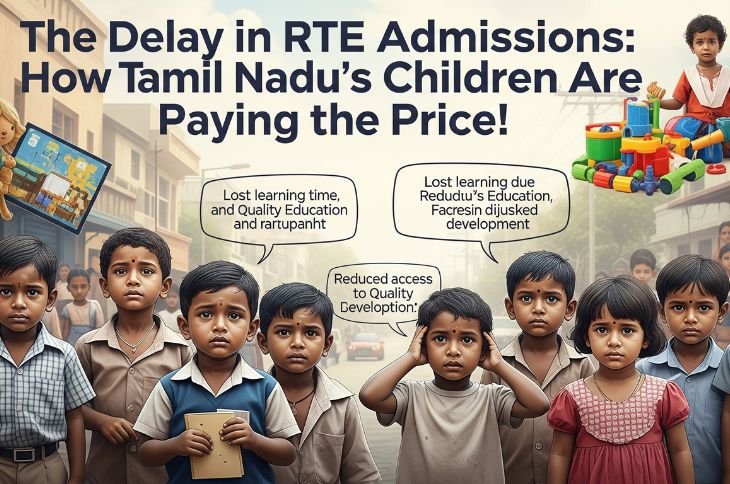
The ongoing delay in Right to Education (RTE) admissions for the 2025–26 academic year in Tamil Nadu has left thousands of underprivileged families in a state of anxiety and uncertainty. While the state government’s standoff with the Centre over education policy and funding continues, it is the most vulnerable students who are bearing the brunt of this impasse.
RTE Admissions: A Process on Hold
Every year, the Tamil Nadu School Education Department is expected to release the RTE admission notification in March, with applications typically opening in April and admissions finalised before schools reopen in June. This year, however, as of early June, the notification has not been released, and the groundwork for RTE admissions has yet to begin. Parents, especially those from economically weaker backgrounds, are left in limbo, unsure whether to wait for the RTE process or seek alternatives in government schools.
“As the government is delaying the release of RTE notification for admissions, I am confused if I should admit my son to a government school instead,” said P Devaraj, a parent from Coimbatore.
The Numbers: Who Is Affected?
- Over 1.5 lakh students have applied for RTE seats, but private schools are refusing admissions, citing delayed reimbursements from the state government.
- More than 4 lakh students in nearly 8,000 private schools are affected by pending payments for previous years.
- Approximately 75,000 students gain free education annually from LKG or Class 1 up to Class 8 under RTE, but the process has stalled.
- Parents are left in the dark, with some private schools even disabling online application portals to prevent new submissions.
Why the Delay?
The primary reasons cited for the delay are:
- Pending reimbursement payments from the state government to private schools for RTE admissions in the last two academic years.
- Central government’s withholding of education funds, including allocations under schemes like Samagra Shiksha and the Sarva Shiksha Abhiyan, which has created a severe financial crunch for the state.
- Administrative hesitation within the Tamil Nadu education department, possibly due to uncertainty over funding and policy direction.
The Impact on Students and Families
- Educational Uncertainty: Many parents are unsure whether to wait for RTE admissions or enroll their children in government schools, risking loss of a year or missing out on better educational opportunities.
- Access Denied: Private schools, facing financial strain, are refusing to implement the 25% RTE quota, directly denying access to children from disadvantaged backgrounds.
- Psychological Stress: The confusion and lack of communication from authorities have left parents anxious and children’s futures uncertain.
- Rumours and Distrust: Growing speculation that the government may discontinue the RTE quota altogether has heightened public anxiety and eroded trust in the system.
What Needs to Change?
Education activists and parents are demanding immediate action:
- Release the RTE admission notification without further delay, ensuring that children do not lose another academic year.
- Clear pending reimbursements to private schools so they can admit students under the RTE quota.
- Greater transparency and communication from the School Education Department to reassure parents and schools about the process and timelines.
Conclusion: Students Deserve Better
The delay in RTE admissions is not just a bureaucratic hiccup—it is a crisis that threatens the educational rights of Tamil Nadu’s most vulnerable children. Unless the state government takes urgent steps to resolve funding issues and streamline the admission process, lakhs of students will continue to suffer the consequences of political and administrative indecision. Education is a right, not a privilege, and it is imperative that the state acts swiftly to uphold this right for every child in Tamil Nadu.
By Amma Gopi, Senior Journalist.
Subscribe to our channels on YouTube & Telegram & ![]() Tamilnadu &
Tamilnadu & ![]() Pondicherry
Pondicherry
